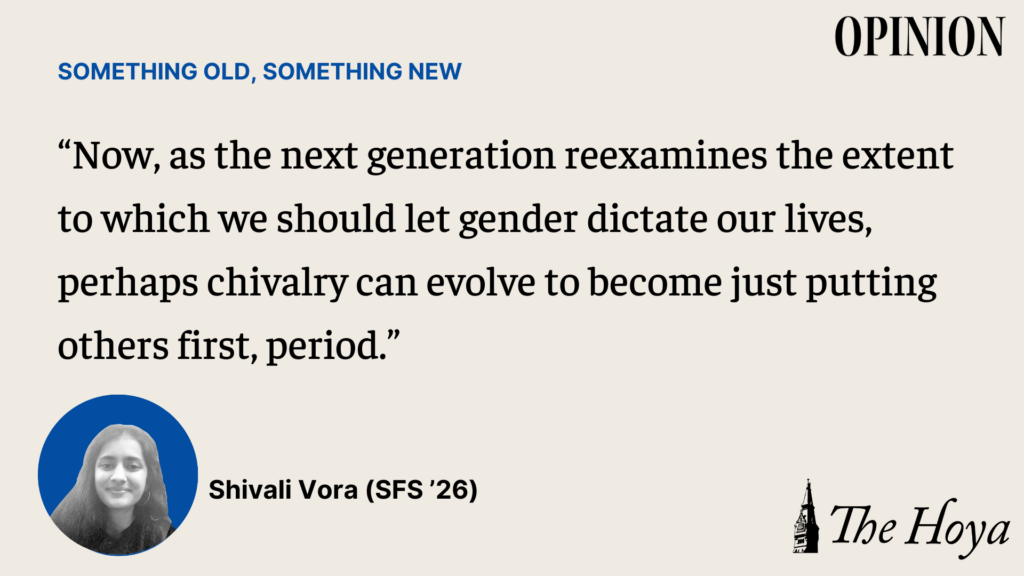’Twas the season of love at Georgetown University last month, and like clockwork, chivalry became more prevalent in February. Signs of it were everywhere, from dinner dates on the waterfront to bouquets, teddy bears and serenades.
In March, Women’s History Month, the tide has turned, and conversations about the demerits of chivalry dominate instead.
Many see chivalry as an archaic concept that upholds a man-made gender binary. Critics argue that the guise of innocuously “honoring” women insidiously undermines their capabilities. Moreover, it can be seen as superficial and not reflective of actual solidarity with women.
Proponents of chivalry insist on its persistent value, even in the context of modern feminism and redefined gender roles, as a tradition of respect and compassion.
Chivalry, which comes from the French word “chevalier,” meaning “knight,” began as a code of conduct in the Middle Ages. It included guidelines for everything from personal hygiene to courtship to loyalty to the monarch whom a knight served, up to and including putting his life on the line. Though these rules governed different facets of life, what they had in common was an obligation to demonstrate courage, propriety and self-sacrifice — and to do so by putting others, namely women, first.
Now, as the next generation reexamines the extent to which we should let gender dictate our lives, perhaps chivalry can evolve to become just putting others first, period.
A classic example of chivalric etiquette is the “sidewalk rule” — walking closer to the street as a sign of care for and protection of the other person. Beyond romantic relationships, this is a common practice between parents and children, older and younger siblings and any other relationship where one person is naturally perceived as the protector of the other. Interestingly, the rule was originally designed so that waste falling from the upper stories of houses along sidewalks would fall on men, not women. With modern trash and sewage systems, that logic is obviously no longer relevant.
Not only is the original intent behind many chivalric practices outdated, but critics of chivalry also argue that it perpetuates heteronormativity and affords women special privileges that should naturally dissipate as oppression is alleviated. Even more problematic is the fact that, in practice, conventionally attractive women receive more chivalric privileges.
One might counter, however, that although the world is moving toward gender equality, it is certainly not there yet. Women still face innumerable inequities, ranging in severity from the pay gap and “pink tax” — the phenomenon in which products targeted toward women and girls like women’s razors are regularly more expensive than equivalent men’s products — in the United States to outright denial of education and other fundamental human rights in Afghanistan. As long as these injustices persist, it is not so unreasonable to expect men to do a little extra in compensation.
While relatively effortless gestures like pulling chairs are still commonplace, more demanding tasks like footing the bill are increasingly contentious.
A 2019 survey found that 63% of male respondents said men should pay on the first date, while only 46% of female respondents said the same. At the same time, some women admit to subconsciously finding “benevolent sexism” — ostensibly “positive” manifestations of sexism, like protectiveness — attractive despite intellectually being against it.
The right balance can be hard to find, but sometimes the youngest among us have the purest perspective. Inspired by an exhibition at the Getty Center in Los Angeles, a heartwarming digital rulebook of chivalry, “The Chivalry Project,” synthesizes children’s ideas about what chivalry should look like in the 21st century. The majority of the project simply is intuitive decency and has nothing to do with gender — from introspections to “be quick to listen and slow to speak” to amusing bare-bones reminders to not “scream at your parents.”
While people tend to pick up these basic manners somewhere along the journey to adulthood, it often takes longer to learn the above-and-beyond habits that require not just integrity of character, but also the boldness to put it into action. Chivalry on its own, while well-intentioned, can turn into mindless behaviors. People were practicing it in the 1800s too, right alongside denying women suffrage. There is nothing wrong with opening doors and holding coats, but what is even more meaningful is speaking out against real injustices when you see them, even when no one else does. That is what will make our generation different.
Chivalry might be nice at the entrance of Leo J. O’Donovan Dining Hall, but it is necessary in casual social interactions when someone speaks disrespectfully about another person, even if in tone rather than explicitly. Beyond Georgetown, when we become employees and employers, chivalry will be less necessary at restaurants than at conference tables and on hiring committees. Modern chivalry must take center stage in salary discussions and task delegations, or anywhere else where a person is vulnerable to being slighted due to an aspect of their identity. Chivalry is often most critical when the beneficiary is not in the room. And that beneficiary need not be a woman at all.
Maybe chivalry is on its way out, but take gender out of the picture, and it can be salvaged. There will always be room for tried-and-true human kindness.
Shivali Vora is a first-year student in the School of Foreign Service. Something Old, Something New is published every third Friday.














